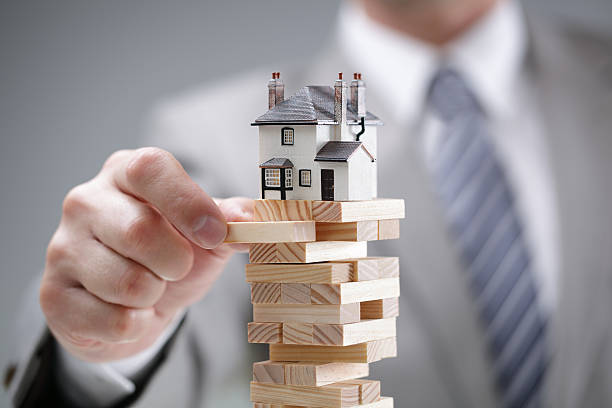Are we in a real estate bubble? If so, when will it burst? Have we learned anything from the 2008 housing market crash or is history doomed to repeat itself? After all, housing prices blew past the 2005 record of 14.4% year over year gain in April of this year. We’re currently standing at a 19.9% year over year price increase, according to an October 27 CNN Business report. What’s going to happen?
These are some of the questions homebuyers are asking themselves (and others) as they consider whether or not it’s a good time to be in the market. The answer most real estate experts give to the question, “Is the housing market going to crash?” is NO. Here are some of the reasons why.
1. There’s no oversupply of inventory for a housing market crash.
“We’ve been under-building for years“, Gay Cororaton, the National Association of Realtors director of housing and commercial research, says. Daryl Fairweather, Redfin’s chief economist tells Business Insider that 20 times fewer homes have been built in the last decade than at any time since the 1960s.
It’s industry oversupply that helps create bubbles.
New home construction hasn’t kept up with demand since 2011, and that’s not likely to change in the near future. When bubbles happen, you typically see supply increase as demand decreases. What’s going on today is just the opposite. There’s a supply shortage coupled with increasing demand.
In 2008, there was an oversupply of residential housing. Combine that with the rise of the subprime mortgage market and speculation, and you have the housing market crash everyone old enough remembers.
2. Supply chains will continue to have challenges.
According to the Associated Builders and Contractors (ABC), construction prices are 23.1% higher this year than they were last year. In addition to price increases, disruptions in the supply chain are making it harder for builders to supply the market with new housing, especially affordable housing. Experts expect this issue to continue for the next year or two, or until the majority of the world has been vaccinated.
A shortage of labor is making the problem even worse. When builders can get the materials they need, they still have trouble finding experienced workers to complete projects. ABC reports an industry loss of 3,000 jobs in August alone. The construction industry has only recovered 79.2% of jobs lost to the pandemic. Ask builders, “Is the housing market going to crash?”, and their resounding answer is NO.
3. More millennials are entering the market.
Millennials are driving the housing market according to Apartment List’s 2021 Millenial Homeownership Report. In just three years, homeownership among millenials has jumped from 40% to 47.9%. Rates have increased in the 25 to 29 age group and accelerated particularly for millennials aged 30 to 34. These first time home buyers are supporting the bottom of the market.
Even though millennials are coming on strong, don’t count out the boomers.
Boomers have seen significant increases in the value of their homes in recent years, and now they’re in the housing market in a big way.
Having deep pockets helps. It gives them a definite advantage when it comes to bidding wars with the younger generation. They’re more likely to make all cash offers, which is a top strategy for winning bidding wars, according to a recent Zillow Premier Agents survey.
4. Interest rates will eventually increase.
The Federal Reserve has shown signs that it will leave interest rates where they are as the economy recovers from the pandemic. After that, it will most likely raise rates to head off overinflation. The Fed will have to raise rates in all areas of the economy to keep inflation low, not just real estate.
Artificially inflated values create bubbles, and lack of inventory is what is driving home values higher. This situation is not likely to change any time soon. no matter what happens with interest rates. That’s one of the reasons economists answer NO to the question “Is the housing market going to crash?”
5. Underwriting is super tight.
The current market cycle is distinguished by extremely tight underwriting. That means buyers have to be able to afford what they’re buying. When the housing market crashed in 2008, lenders were handing out loans to almost anyone who could sign on the dotted line.
This led to homeowners in over their heads and unable to pay their mortgages. Foreclosures and loss of financial security followed. Mortgage requirements are a lot stricter today, and reckless lending isn’t driving the market. Instead it’s real supply and demand.
The new FICO 10 credit scoring model is expected to increase the scores of 40 million Americans and decrease the scores of some 40 million others, according to a CBS News report. The reason: FICO 10 factors in personal loans. It also looks at borrowers’ accounts and payments over an extended period of time. This offers a better view of credit history.
6. There are signs the market is slowing down, which is not the same thing as a housing market crash.
Prices are still climbing, but July was the third month in a row that saw decreased gains. From May to June, there was a 3.3% rise in unsold homes, according to the National Association of Realtors.
A certain amount of buyer fatigue seems to be setting in as prices continue to climb. Even the most enthusiastic buyers have limits on what they’re willing to pay. Losing out time after time to buyers who are offering sellers all cash or big down payments gets discouraging for buyers in the market for the first time.
The Utah housing market is a good example of why a housing market crash is unlikely.
Although Salt Lake County’s median home prices have jumped 28% in the last year (up from $430,000 to $550,000), according to the Salt Lake Board of Realtors, the number of home sales has plummeted. In the third quarter of 2021, 18% fewer homes across the Wasatch Front sold. This is a good indication the market is stabilizing, making a housing market crash remote.
Although Realtors are still seeing multiple offers on homes, the numbers are going down. Prices are still increasing, and inventory is low, however.
Why is a good home appraisal more important than ever?
Sellers have to put price tags on their homes. This can be challenging any time, but it’s especially challenging in today’s market. You walk a fine line between valuing your home too high and too low. If you value it higher than market value, you’ll get fewer offers, and the sale may fall through. If you value your property too low, you’ll get plenty of offers, but you’ll also leave money on the table.
On the buyer’s side, unless you’re paying all cash, you’ll need a mortgage. In order to get one, almost any lender is going to require an appraisal. Lenders aren’t going to risk loaning you more than the home is worth, and losing money in the event you default.
When you need to know the true value of your real estate, you need a licensed, certified, and experienced appraiser who knows the Utah market and will give you an unbiased opinion of value. ExcelAppraise has been a leading provider of residential and commercial real estate valuations for the last 14 years.
Give us a call today at 1-801-882-2292 to request a free quote!

